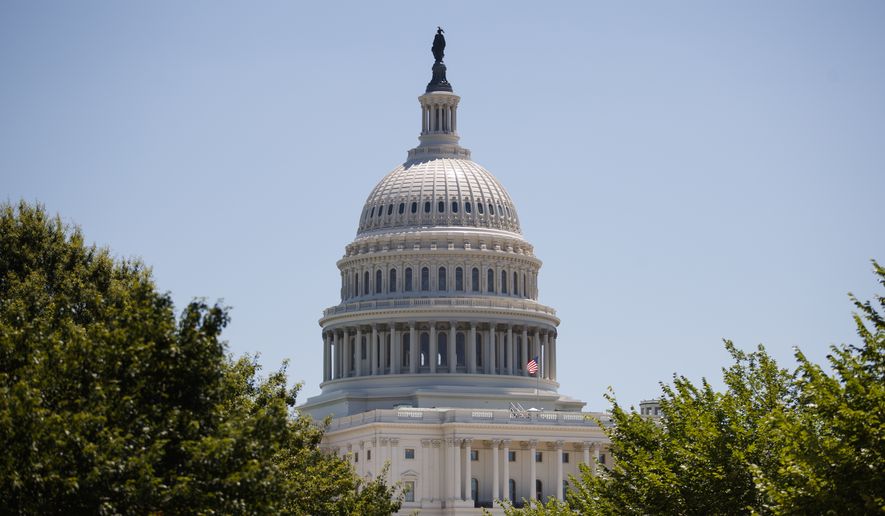Congress’ treasure trove of internal reports written by the authoritative research staff at the Library of Congress went online Tuesday, giving average Americans access to the same information their lawmakers see.
The reports, covering issues such as border security, unemployment insurance payments, and building and naming Navy ships, have been jealously guarded for years by some on Capitol Hill. They argued that the Congressional Research Service’s work was intended only for lawmakers’ eyes and feared making it public could skew analysts’ work.
But transparency advocates won the fight. Language written into the massive spending bill approved this year demands that CRS post its work to the public.
“The era of secrecy is over, and CRS reports are now coming online for all to read,” said Rep. Leonard Lance, New Jersey Republican, who said the move is “a win for good governance.”
That could total thousands of reports a year, lawmakers said, though just 628 reports were available as of Tuesday.
Users gain access to the reports through a keyword search at crsreports.congress.gov. There is no obvious link to browse all the reports — functionality that is available to staffers inside the Capitol — though entering a blank search will bring up a list of the reports that have been posted.
Carla Hayden, the librarian of Congress, said the system was “designed to be as user-friendly as possible.”
“In keeping with our desire to engage users with the library and its materials, we are happy to see these reports put to the widest use possible,” she said in an online announcement Monday.
The site appears to be up to date: Monday’s reports on the handling of illegal immigrant children, U.S. policy toward Afghanistan and federal grants to local schools were online as of Tuesday morning. But a report available internally on federal agency liaisons to Capitol Hill was left off the public site.
The public page also does not include CRS’s legal memos or issue briefs, which are available internally on Capitol Hill.
That means the new Library of Congress page won’t yet replace private websites such as EveryCRSReport.com, run by Demand Progress, which posts the data thanks to submissions from congressional offices.
Daniel Schuman, policy director at Demand Progress, has spent years advocating for the Library of Congress to publish the reports. He said this week’s move is important symbolically but falls short of what the law requires.
“We’ve crossed the Rubicon,” he said. “That is a significant psychological change for them. The downside is they’re only publishing a fifth to a tenth of the reports they’re supposed to.”
In addition to the legal memos and issue briefs, the data set goes back only to the beginning of 2018. That excludes thousands of reports still considered current by CRS dating back years.
The agency says it is working to get those online in the coming months.
The reports are available only in PDF format. On Capitol Hill, they can be accessed as text. Mr. Schuman said text would be easier to access from devices such as smartphones or tablets.
He also suggested the ability to sign up for alerts when reports are updated.
He said he reached out to the library with suggestions but was ignored.
“I would love to close up shop and go home and do something else,” he said. “They should be the authoritative, complete, final source for all nonconfidential CRS reports. That’s what the law says.”
Some CRS reports amount to updates on where bills stand in the legislative process or give history and background to long-standing government policies. Some reports, though, include groundbreaking analysis or legal conclusions that are newsworthy.
Steven Aftergood, who directs the Federation of American Scientists Project on Government Secrecy, also called the public release evidence of a culture change.
He said the data will be valuable to plenty of people, including reporters and students trying to bone up on the ins and outs of public policy decisions.
“CRS plays an important and unappreciated role in our political culture. It’s one of the few remaining islands of the political center,” he said. “You find CRS reports being quoted in left-wing publications, right-wing publications and in mainstream media. These reports represent a shared vocabulary of almost everyone who’s interested in public policy. That’s a priceless resource.”
Mr. Schuman’s site, with about 50,000 hits per month, lists the trending reports right now as one on Medicare premiums, one on the Supreme Court nomination selection process, one on veterans’ benefits eligibility and one on federal housing rental assistance programs.
CRS reports have long been hot commodities inside Washington, where some lawmakers would share them with interest groups or lobbyists. Lawmakers said a small cottage industry built up with people who had access to reports selling them.
Sen. Patrick J. Leahy, Vermont Democrat and a staunch advocate for public release, said the new system puts the public on even footing.
“I have long championed transparency and an open government, and I am glad that the American people will finally have the same access to these taxpayer-funded reports that lobbyists and insiders enjoy,” he said. “Open access to information is vital to a functioning democracy, and this rollout is long overdue.”
The reports posted online are mostly the same as the ones members of Congress can see — though the email addresses and phone numbers for the CRS analysts have been stripped from the public versions.
• Stephen Dinan can be reached at sdinan@washingtontimes.com.




Please read our comment policy before commenting.